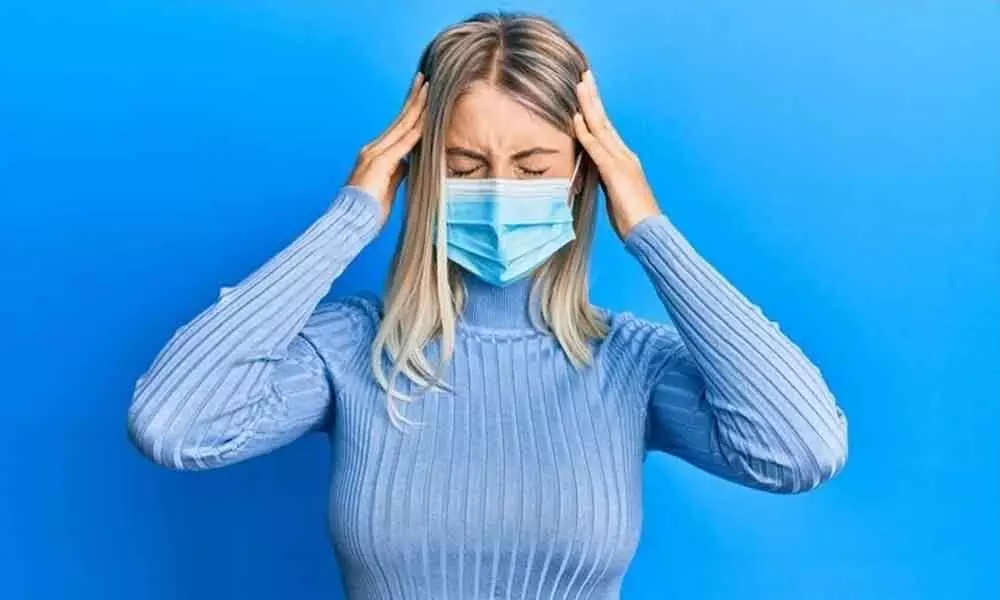Live
- Traffic diversions for ‘Vision’ meet
- YSRCP stir for MSP today
- Direct flights from Rajahmundry to major cities soon
- Search intensified for Gowtham Reddy as HC dismisses his bail plea
- Santosh Trophy final round to begin in Hyderabad tomorrow
- BGT: Rohit must return to opening for Brisbane Test, says Ponting
- Swimming sensation Havya steals the show
- NDTL gets WADA nod to manage Athlete Biological Passport
- BWF World Tour Finals: Treesa-Gayatri wins 2nd match to keep semis hopes alive
- Youngest ever to conquer chess world
Just In
Neuro problems on the rise among patients post Covid-19 recovery


Neuro problems on the rise among patients post Covid-19 recovery (Krakenimages.com / Shutterstock)
People with comorbidities prone to neuro issues, say doctors
Bengaluru: Doctors are witnessing a rise in post-Covid-19 patients coming back with neurological problems roughly two weeks after their recovery. Patients must watch out for neurological symptoms and get themselves evaluated at the first sign, say doctors.
Symptoms range from mild in the form of headache, myalgia, joint pains, loss of smell and taste (Anosmia), facial palsy (Bell's palsy) to severe manifestations like confusion (encephalopathy), encephalitis, stroke, seizures and neuromuscular disorders like weakness, myositis and Guillain Barre syndrome (GB Syndrome).
There can also be extremely severe cases of seizures, memory problems, stroke and neuromuscular problems that require prolonged treatment.
Patients with prior comorbidities are more prone to develop these symptoms post Covid-19 recovery. These are predominantly seen in patients who required ICU treatment than those who were asymptomatic. Noticeably, the patients lie in the age group of 25-45 and tend to suffer from anxiety.
Generally, patients start coming forward with these issues somewhere between 2 weeks to 2 months. But in some cases, the symptoms have appeared earlier than 2 weeks as well. Doctors say that most of these symptoms go away after few months but they can also last from 6-8 months.
"We have been seeing patients developing neurological symptoms post Covid-19 for the past 1.5 years but now we are seeing at least 2-3 patients per week," said Dr Sreekanta Swamy, Senior Neurologist and Head of Neurology at Aster Hospital.
Not all patients are equally susceptible to these symptoms. Patients without prior comorbidities like Parkinson's disease, stroke, psychiatric disorders, dementia showed worsening of their current situations. A patient at Aster Hospital suffering from Parkinson's disease started showing memory impairment after recovering from Covid-19.
Dr Satish Chandra, Senior Consultant Neurology at Apollo Hospital, Jayanagar, said "We have seen 3 instances in post-Covid patients of the rare case central pontine myelinolysis that affects the brain stem."
Doctors say that it is hard to pinpoint the exact cause for this development but could be because of multiple reasons.
It could range from the body's reaction to antigen/antibody leading to damage of the blood vessel and minutely damaging the nerves to steroids used in treatment to fear or phobia associated with the diseases triggering of the symptoms to the kind of treatment and socialisation received by the patient.
"The delta Covid variant causes severe respiratory illness. The risk of neurological problems is more in people with severe Covid infections. However epidemiological data is lacking at this point," said Dr Shiva Kumar R, Senior Consultant Neurologist & Epileptologist, Sakra World Hospital.
Addressing the lack of definite data in this field, Dr Jagadish Hiremath, Medical Director at Ace Suhas Hospital, said that "Institutions that have been working in the area of neurological science must work on gathering and sharing information on neurological problems suffered by Covid patients and help medical fraternity have much clarity."
Though there has been a rise in cases in the second wave, doctors say it could also be the result of a lack of awareness of various complications of Covid-19 as well. But this development is not limited to India alone. As per the Lancet journal published in September 2020, "A growing number of case reports and series describe a wide array of neurological manifestations in 901 patients, but many have insufficient detail, reflecting the challenge of studying such patients."
Medical experts specifically recommend visiting a neurologist and not a general physician at the first sight of the symptoms. People need to be more vigilant after their recovery and look out for symptoms. Physical exercise and socialisation are advised to avoid such developments but they do not always guarantee protection from these symptoms.
"Regular follow up and monitoring for early symptoms of neurological disease is the key in early identification of neurological problems and treatment. Diagnose and treat early to reduce complications and long-term deficits," added Dr Shiva Kumar R.
Though the treatment for neurological problems is dependent on case to case basis, there haven't been any cases of vaccinated patients reporting such issues. Doctors believe that even if cases arise, the severity will be reduced among vaccinated individuals. They also suggest vaccination as the best way of protection from the development of neurological symptoms.

© 2024 Hyderabad Media House Limited/The Hans India. All rights reserved. Powered by hocalwire.com






